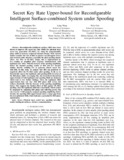JavaScript is disabled for your browser. Some features of this site may not work without it.
| dc.contributor.author | Wei, Zhuangkun | |
| dc.contributor.author | Wang, Liang | |
| dc.contributor.author | Guo, Weisi | |
| dc.date.accessioned | 2023-02-14T09:19:28Z | |
| dc.date.available | 2023-02-14T09:19:28Z | |
| dc.date.issued | 2023-01-18 | |
| dc.identifier.citation | Wei Z, Wang L, Guo W. (2023) Secret key rate upper-bound for reconfigurable intelligent surface-combined system under spoofing. In: 2022 IEEE 96th Vehicular Technology Conference (VTC2022-Fall), 26-29 September 2022, London | en_UK |
| dc.identifier.isbn | 978-1-6654-5469-8 | |
| dc.identifier.issn | 1090-3038 | |
| dc.identifier.uri | https://doi.org/10.1109/VTC2022-Fall57202.2022.10012819 | |
| dc.identifier.uri | https://dspace.lib.cranfield.ac.uk/handle/1826/19176 | |
| dc.description.abstract | Reconfigurable intelligent surfaces (RIS) have been shown to improve the secret key rate (SKR) for physical layer secret key generation (PL-SKG), by using the programmable phase shifts to increase reciprocal channel entropy. Most current studies consider the role of RIS on passive eavesdroppers (Eves) and overlook active attackers, especially the pilot spoofing attacks (PSA). For PSA in PL-SKG setups, this is implemented by Eve sending an amplified pilot sequence simultaneously with legitimate user Alice. With the increase of the spoofing amplifying factor, the channel probing results at Bob and Eve become similar, thereby enabling Eve to generate shared secret key with Bob. In this work, we analyze how RIS can positively or negatively affect the PL-SKG under pilot spoofing. To do so, we theoretically express the legitimate and spoofing SKRs in terms of the RIS phase shifts. Leveraging this, the closed-form theoretical upper bounds of both legitimate and spoofing SKRs are deduced, which lead to two further findings. First, the legitimate SKR upper-bound does not vary with RIS phase shift vector, but reduces drastically with the increase of the spoofing amplifying factor. This suggests the limited effect of RIS against PL-SKG spoofing, since the legitimate SKR has a hard limit, which cannot be surpassed by adjusting RIS phase and reflecting power, but can even be 0 with properly assigned spoofing amplifying factor. Second, the spoofing SKR upper-bound shows a large gap from the non-optimized SKR, which indicates a potential for RIS phase optimization. | en_UK |
| dc.language.iso | en | en_UK |
| dc.publisher | IEEE | en_UK |
| dc.rights | Attribution 4.0 International | * |
| dc.rights.uri | http://creativecommons.org/licenses/by/4.0/ | * |
| dc.title | Secret key rate upper-bound for reconfigurable intelligent surface-combined system under spoofing | en_UK |
| dc.type | Conference paper | en_UK |
| dc.identifier.eisbn | 978-1-6654-5468-1 | |
| dc.identifier.eissn | 2577-2465 |
Files in this item
The following license files are associated with this item:
This item appears in the following Collection(s)
-
Staff publications (SATM) [4367]

